West Coast Blues
Few regions have been more consistently Democratic than the West Coast. Even compared with the Northeast, where Republicans occasionally win governors’ offices, the appropriately named “left coast” has been adamantine in its progressivism. Republicans haven’t won statewide office in California in years; in Oregon, it’s decades. Washington has elected a Republican secretary of state, but she now serves in the Biden administration. And the region’s major cities are overwhelmingly blue.
That could be changing, at least a bit. As cities from Seattle and Portland to San Francisco and Los Angeles fight crime and disorder, something of a political rebellion has broken out. One progressive fashion entrepreneur has called San Francisco “a city of chaos,” where his employees are not safe. The city, by some estimates, has deteriorated further and faster than virtually any urban area in the country. Within the last year, though, San Francisco recalled its progressive district attorney, Chesa Boudin, as well as left-wing members of the city school board. Meantime, remarkably, Seattle elected a Republican as city attorney, and Los Angeles district attorney George Gascón has faced backlash, and a possible recall. Voters have a chance to continue this rebellion this week.
Progressive candidates will likely eke out some wins. L.A. mayoral candidate and former Republican Rick Caruso has recovered some momentum after a weak summer and could conceivably beat progressive opponent Karen Bass, though Bass leads in betting markets. In Washington, long-time Democratic senator Patty Murray faces a surprisingly tough challenge from Republican Tiffany Smiley, though Murray, too, is favored.
But some heterodox candidates seem poised for upsets. In Oregon, Christine Drazan could become the first Republican governor since the 1980s, replacing the ultra-progressive and highly unpopular Kate Brown. In California, Republican Lanhee Chen, endorsed by the state’s usually lockstep progressive press, could be elected state controller, in what would be the first statewide win for a Republican since 2006.
Crime and chaos drive the GOP revival, but looming economic and fiscal crises are also factors. The once-flourishing tech industry may face at least a short-run implosion that has rattled investors. In California, where the post-pandemic recovery has lagged, the one industry left booming in Silicon Valley may be psychotherapy. Don’t expect a more business-friendly climate to emerge after the election. New proposals for wealth taxes, a 32-hour work week, and controls on franchise employment are likely—despite regional struggles with pensions, jobs, and business flight.
The physical economy, too, has declined across the West Coast. Manufacturing is lagging, particularly in California. Due to regulations and a lack of storage for water supplies, the Golden State’s once-dominant agriculture sector is declining. The state’s highly regulated housing sector has lagged on construction, leaving the state vulnerable to a real-estate downturn that is already hurting housing markets.
In addition, state policies drive electricity and fuel prices that rank among the nation’s highest, discouraging price-sensitive industries from staying in state and putting millions on the edge of energy poverty. California, in fact, suffers the nation’s highest rates of cost-of-living adjusted poverty, with residents of the less temperate and poorer interior far less able to pay for the state’s green zealotry than residents on the coast. And California, despite massive education spending, suffers the highest percentage of illiteracy of any state.
Read the rest of this piece at City Journal.
Joel Kotkin is the author of The Coming of Neo-Feudalism: A Warning to the Global Middle Class. He is the Roger Hobbs Presidential Fellow in Urban Futures at Chapman University and Executive Director for Urban Reform Institute. Learn more at joelkotkin.com and follow him on Twitter @joelkotkin.

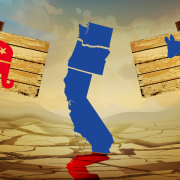
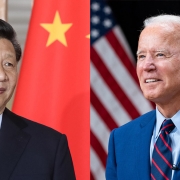
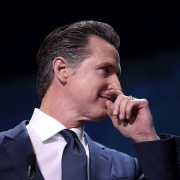 Gage Skidmore, used under CC 2.0 License
Gage Skidmore, used under CC 2.0 License
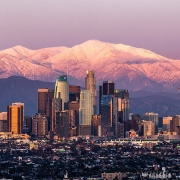
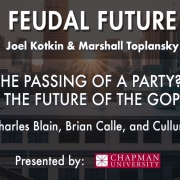
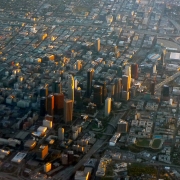 D. Ramey Logan, used under CC 4.0 License
D. Ramey Logan, used under CC 4.0 License
